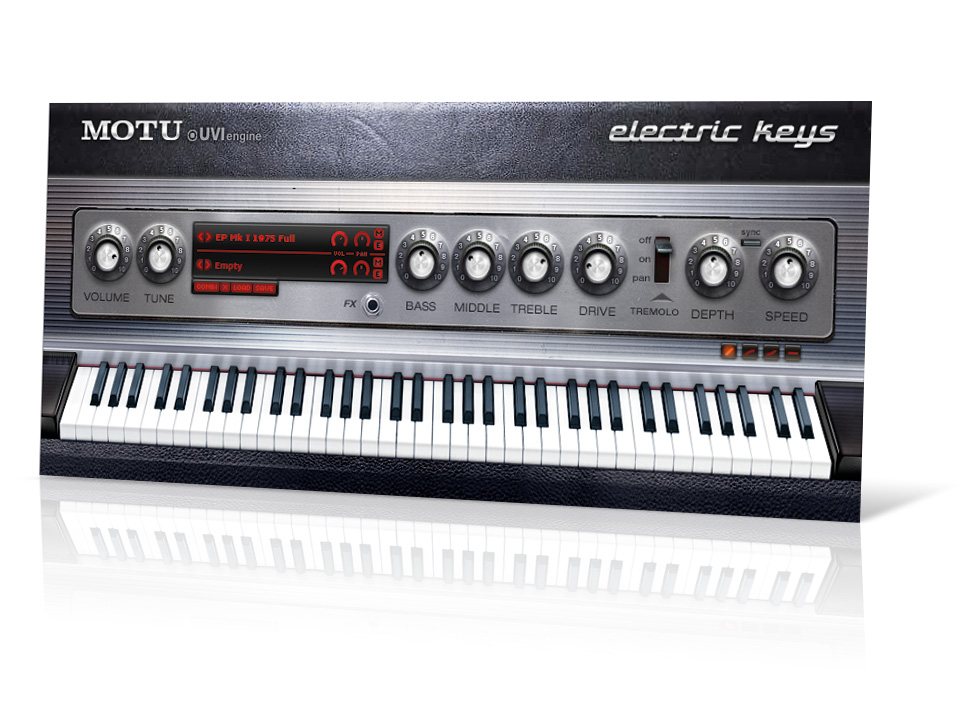MusicRadar Verdict
Once you've got it working, Electric Keys gives you all the classic keyboard sounds that you're ever likely to need.
Pros
- +
Sounds great. Very easy to use. Slick FX Rack. iLok is included.
Cons
- -
Problems with installation.
MusicRadar's got your back
Certain synthesizer sounds may drift in and out of fashion, but it seems that vintage keyboard tones are perennially popular. Producers call on Fender Rhodes and Wurlitzer sounds on a daily basis, while electric organs are used by musicians in genres as diverse as rock, jazz and dance.
It's these instruments (and others) that MOTU has sampled for its Electric Keys package, demanding up to 40GB of hard drive space (you can pick and choose soundbanks).
The manual suggests that you copy the soundbank files to your hard disk before running the installer - these are spread across five DVDs, so it can take some time. What's more, it states that you can put them on any internal or external drive (or drives), provided it spins at a minimum of 7200RPM and is NTFS or HFS+ formatted.
Frustratingly, our tests indicated otherwise. Whenever we tried to run Electric Keys with the soundbanks on a separate drive, the software simply didn't find them, and there's no option to browse to them.
Some users have solved this problem by creating aliases, but the only way we could get Electric Keys to run was to put the soundbanks in a specific folder on the main disk.
Overview
Not a good start, then, but thankfully things improve when (or if) you do get up and running, and an iLok dongle is supplied, in case you don't already have one.
The interface, which changes skin depending on which keyboard you have loaded, is very straightforward, offering, from left to right: master volume and pan controls, preset and combi browsing, a button to open up the FX Rack, then tone and tremolo controls.
Want all the hottest music and gear news, reviews, deals, features and more, direct to your inbox? Sign up here.
You can also open an Expert Settings window that enables you to get your hands dirty with some of Electric Keys' more advanced features (there's filter and amp/filter envelopes, for example).
As you'd expect, though, the most impressive thing about Electric Keys is its soundset. The electric pianos are solid - though there's nothing here to blow away the competition - and the organs sound appropriately 'vintage', too.
The library goes way beyond these usual suspects, though, throwing funky Clavinets, 80s-sounding e-pianos (think Phil Collins and Keane), string machines, a tape sampler, and a few lesser-known keyboard instruments into the mix. Helpfully, the manual tells you which artists each type of 'board is most associated with.
As well as the numerous presets, you also get a good selection of Combis; Electric Keys' architecture enables you to layer up two sounds at once, each of which can have its own volume, pan and effects settings.
Effects
Speaking of which, the supplied effects processors aren't found on the main interface; instead, you have to click the FX Rack button to open a dedicated window.
Sitting at the top of this is the Amp Simulator, while below you'll find Filter, Phaser, Flanger, Chorus and Vinyl sections. Down at the bottom are Delay and Reverb processors.
The signal runs through the effects in pretty much the order listed (though the Vinyl processor sits at the very end of the chain) and the Rack can do a good job of giving your sounds that extra bit of oomph. There are some useful multi-effect presets, too - our only real grumble is that you can't use the FX Rack as a separate plug-in.
Summary
Despite getting off to a dodgy start with the installation procedure, Electric Keys eventually won us over - you can't really argue with the quality of the results you can get with it. If you can spare a couple of hundred quid and 40GB of disk space (which may or may not have to be on your system drive), it hits the mark.
Rhodes, Clavinet, Organ and 'Tron' sounds from the Electric Keys library:
Computer Music magazine is the world’s best selling publication dedicated solely to making great music with your Mac or PC computer. Each issue it brings its lucky readers the best in cutting-edge tutorials, need-to-know, expert software reviews and even all the tools you actually need to make great music today, courtesy of our legendary CM Plugin Suite.

